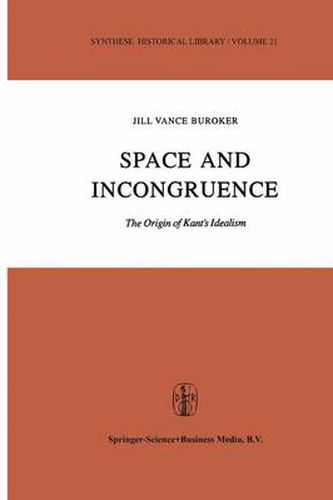Readings Newsletter
Become a Readings Member to make your shopping experience even easier.
Sign in or sign up for free!
You’re not far away from qualifying for FREE standard shipping within Australia
You’ve qualified for FREE standard shipping within Australia
The cart is loading…






This title is printed to order. This book may have been self-published. If so, we cannot guarantee the quality of the content. In the main most books will have gone through the editing process however some may not. We therefore suggest that you be aware of this before ordering this book. If in doubt check either the author or publisher’s details as we are unable to accept any returns unless they are faulty. Please contact us if you have any questions.
Kantian transcendental idealism is the thesis that fundamental aspects of experience are contributed by the perceiving subject rather than by the things experienced, and are not features of things as they exist independently of sensible perceivers. This is undoubtedly the most striking and at the same time the most puzzling of Kant’s Critical views. It is striking because nothing could be less commonsensical than the beliefthat things as we perceive them have nothing in common with things as they are independently ofbeing per ceived. From a more technical point of viewthe doctrine is puzzling because Kant apparently does not support it very well. Beginning with Kant’s con temporaries, critics have pointed out that among all the arguments for the theory in the CritiqueofPureReason, none entails the conclusion that things in themselves cannot be like objects of sense experience in any way. So, for example, although transcendental idealism is compatible with Kant’s theory of synthetic a priori knowledge, there is nothing in the analysis of the syn thetic a priori ruling out the possibility that features contributed to experi ence by the perceiving subject correspond to characteristics of things in them selves, although we might never know this to be so. And even though Kant sees transcendental idealism as a solution to the Antinomies, this is at best indirect support for the view;there are undoubtedly other ways to get around these traditional metaphysical puzzles.
$9.00 standard shipping within Australia
FREE standard shipping within Australia for orders over $100.00
Express & International shipping calculated at checkout
Stock availability can be subject to change without notice. We recommend calling the shop or contacting our online team to check availability of low stock items. Please see our Shopping Online page for more details.
This title is printed to order. This book may have been self-published. If so, we cannot guarantee the quality of the content. In the main most books will have gone through the editing process however some may not. We therefore suggest that you be aware of this before ordering this book. If in doubt check either the author or publisher’s details as we are unable to accept any returns unless they are faulty. Please contact us if you have any questions.
Kantian transcendental idealism is the thesis that fundamental aspects of experience are contributed by the perceiving subject rather than by the things experienced, and are not features of things as they exist independently of sensible perceivers. This is undoubtedly the most striking and at the same time the most puzzling of Kant’s Critical views. It is striking because nothing could be less commonsensical than the beliefthat things as we perceive them have nothing in common with things as they are independently ofbeing per ceived. From a more technical point of viewthe doctrine is puzzling because Kant apparently does not support it very well. Beginning with Kant’s con temporaries, critics have pointed out that among all the arguments for the theory in the CritiqueofPureReason, none entails the conclusion that things in themselves cannot be like objects of sense experience in any way. So, for example, although transcendental idealism is compatible with Kant’s theory of synthetic a priori knowledge, there is nothing in the analysis of the syn thetic a priori ruling out the possibility that features contributed to experi ence by the perceiving subject correspond to characteristics of things in them selves, although we might never know this to be so. And even though Kant sees transcendental idealism as a solution to the Antinomies, this is at best indirect support for the view;there are undoubtedly other ways to get around these traditional metaphysical puzzles.